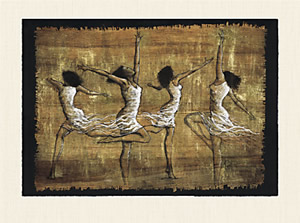Eat the Fat, Drink the Wine
For Sunday January 21, 2007
Lectionary Readings (Revised Common Lectionary, Year C)
Nehemiah 8:1–3, 5–6, 8–10
Psalm 19
1 Corinthians 12:12–31a
Luke 4:14–21
 |
Calcutta woman by Partha Pal. |
A few years ago I received a letter from a friend in ministry who had endured considerable mental and spiritual anguish negotiating a divorce, along with the emotional blow back that always follows—regret, sadness, anger, pain, confusion, depression, weight loss, relief, and a welter of other mixed emotions. But now, John wrote, he had met a woman he planned to marry. Now, he said, it was time to move beyond the failure, grief and despair of the past to celebration, joy, and hope for the future. It was time, he said, quoting this week's Old Testament reading, "to eat the fat and drink the sweet wine" (Nehemiah 8:10, NRSV). I could only “rejoice with those who rejoice” (Romans 12:15).
My friend is no exception. A few weeks ago my uncle wrote that his son tried to commit suicide with pills and alcohol. His email made me think about my circle of family and friends whom I love, and the devils that threaten to undo them—hospitalization for clinical depression, obsessive compulsive disorders, obesity, brain tumors, suicide, vehicular manslaughter, teenage eating disorders, cancer, involuntary unemployment, and the death of a parent. If my small sample of disappointments, disasters, failures, tragedy, and brokenness represents our baseline normal, joy and rejoicing do not seem to follow. Eat the fat and drink the sweet wine?
 |
Malick Sidibé, Look at Me! (1962), Balako, Mali. |
Yes. As the Scriptures often do, the story of Nehemiah from this week's Old Testament reading offers a counter-intuitive, counter-cultural, and subversive piece of advice: do not yield to the spirit of despair. Do not default to gloom and doom. Instead, choose the radical option of genuine joy. Yes, eat the fat and drink the sweet wine.
The story of Nehemiah follows the humiliating defeat of Judah by pagan Babylon (how could God abandon his elect people?), the survival of a demoralized remnant, then their improbable efforts to rebuild the ruins of Jerusalem years later under the Persian king Artaxeres (465–424 BC). When Nehemiah heard the story of his people's “great distress and reproach,” he wept, mourned, fasted and prayed for days on end (1:3–4). But he also took action to rebuild the fallen walls of Jerusalem. Once rebuilt, the people gathered in the public square as God's community to hear Ezra read the law of Moses. Overcome with bittersweet emotions, the people wept.
Then Nehemiah said to all the people, “This day is holy to the Lord; do not mourn or weep.” For all the people were weeping when they heard the words of the law. Then he said to them, “Go, eat of the fat, drink of the wine, and send portions to him who has nothing prepared; for this day is holy to our Lord. Do not be grieved, for the joy of the Lord is your strength.” And all the people went away to eat, to drink, to send portions and to celebrate a great festival. (8:9–12)
Yes, there was a proper time to grieve the devastation of Jerusalem; but there also came a time to move forward and to rejoice, however modest the remnant's circumstances compared with former times and expectations. There was then and is today a time to eat the fat and drink the sweet wine.
 |
"Joy of Life" by Lawrence Finney. |
Joy can be an ambiguous term. Many people link it with happiness and the enhancement of their circumstances—health, success, fame, wealth, pleasure, fun, or good fortune. In that sense of the word, joy is derivative, attached to and dependent upon some external source. Joy of that sort can exude a sense of smugness, entitlement, narcissism, and even self-pity in the absence of desired objects. Such joy seldom lasts for long or is genuinely fulfilling, for it creates its own set of needs that are rarely satisfied. We all know privileged people who enjoy the most fortunate of personal circumstances but who are never content, deeply insecure, and always unhappy, and, conversely, people who possess little but nevertheless radiate equanimity and gladness. And which is sadder, that one could be so easily fulfilled by so very little—a new car, a bigger house, a better job; or that you readily miss so much—the blast of the ram's horn or the shout from the rooftop?
Joy is more elusive, more subtle and more nuanced than happiness, a predisposition to cheerfulness, persevering with emotional extra effort, or the luck of good fortune. In his autobiography Surprised By Joy CS Lewis describes joy as "an unsatisfied desire which is itself more desirable than any other satisfaction. . . I doubt whether anyone who has tasted it would ever, if both were in his power, exchange it for all the pleasures in the world." Whereas we can manipulate circumstances to our own advantage to obtain what we think will bring happiness, or expend great efforts in pleasure-seeking, joy is entirely gratuitous. You cannot earn it, buy it, or deserve it. It is a divine gift to receive rather than a selfish goal to pursue.
 |
"Rejoice" by Monica Stewart. |
The opposite of joy is not sadness or sorrow but anxiety. Jesus encouraged his followers, "do not worry about your life. . . Who of you by worrying can add a single hour to his life?" Consider the joy of the birds in their morning songs, or the flowers in their spring time glory, he said. If the Lord of the universe clothes creation with such extravagance, then we can rejoice in his love regardless of our circumstances. Jesus says that we rest in God's love "so that my joy may be in you and that your joy may be complete" (John 15:11).
In his poem The Revival the Welsh poet and physician Henry Vaughan (1621–1695) challenges us to open our "drowsy eyes" to experience "the drops and dews of future bliss." This is a choice we can make or refuse.
Unfold! Unfold! Take in His light,
Who makes thy cares more short than night.
The joys which with His day-star rise
He deals to all but drowsy eyes;
And, what the men of this world miss
Some drops and dews of future bliss.Hark! How His winds have chang’d their note!
And with warm whispers call thee out;
The frosts are past, the storms are gone,
And backward life at last comes on.
The lofty groves in express joys
Reply unto the turtle’s voice;
And here in dust and dirt, O here
The lilies of His love appear!
"The greatest honor we can give Almighty God," wrote the English mystic Juliana of Norwich, "is to live gladly because of the knowledge of his love." No matter how bleak the tragic course of history, how unnerving our personal circumstances, or how pessimistic the forecasts of cultural historians, with joy we can expect his love to blossom even in the dust and dirt of our lives.
For further reflection:
* Contemplate the words of the French Nobel laureate André Gide (1869–1951):"Joy is rarer, more difficult, and more beautiful than sadness. Once you make this all-important discovery, you must embrace joy as a moral obligation."
*
What are the differences between joy and happiness?
* What are some common counterfeits for joy?
* Can a person choose joy?
* See C.S. Lewis, Surprised by Joy.





